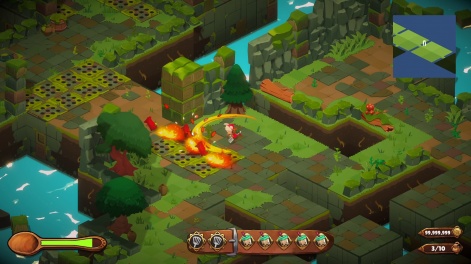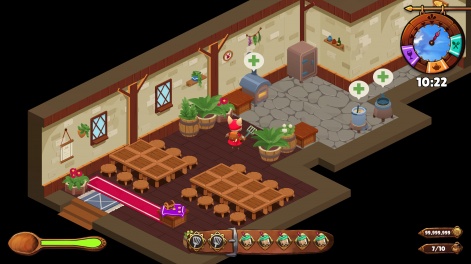The Big Indie Pitch is a regular event run by the makers of Pocket Gamer and PC Games Insider. It sees indie developers engage in a speed-dating-styled pitching competition for fame and those sweet, sweet promotional packages.
The event gives indies five minutes to pitch their games to a panel of press, publishers and industry pundits. The judges then pick three winners and everybody gets valuable feedback.
The indie view
The Big Indie Pitch is getting bigger and bigger as we bring it to events all across the world. To give you an idea of what the event is like, who attends the events and the games on show, we've sat down with a number of past Big Indie Pitch contestants to offer their views.
Today, we're speaking to Shawn Toh from Battlebrew Productions, who submitted Cuisineer to The Digital Big Indie Pitch (PC+Console Edition) #13, and walked away as the winner.
Sophia Aubrey Drake: Tell us a little about yourself and your indie studio - who is on the team, and what are their inspirations?
Shawn Toh: We’re a ragtag bunch of folks. Some of us are ex-AAA, some are pretty new to the industry. I’d say we’re united by a love of food, good games, anime and memes.
- I’m Shawn and I’m bald. I’m living a well-rounded life. Literally. I also do a whole bunch of system design and janitorial services at the studio. I like ramen a lot.
- Ben is our lead programmer, and he identifies as a Psyduck most of the time. Here’s what he had to say: I'm Ben. I enjoy slower-paced single-player games especially now that I have a baby to care for. Making games is a passion, I hope to make more games that people will care about playing. I like salmon sashimi I guess. Tuna if I’m in Japan.
- Conan (Programmer): Hello, I'm Conan and I play a ton of sandbox, automation and puzzle games. The variety of mechanics I see in those games always keeps me thinking about my own twists and additions on them. I also like discussing game system architecture. For real, I collate and organize notes on the game systems as I encounter them. Hmmm, I like yakitori.
- Seb (Programmer): I'm Sebastian and I'm a metalhead that loves action games and RPGs. As for food, goddamn that’s tough. Lengua tacos.
- Lin (Level Design): I build villages in sandbox games all the time because I think it's fun. Also, I do level design at work...and in sandbox games. I love meat. Medium rare new york strip steak is the BEST.
- Lydia (Game Design): I'm Lydia and I like cleaning things up because my room/life is in a constant state of mess. I also like cooking food from that critically acclaimed MMORPG.
- Charissa (2D Art): I like making people feel things with my drawings. What things? Confused but horny is the highest praise. Favourite food? That’s a deep question.
- Zoe (3D Art): I’m Zoe and I sleep a lot. I do FX and stuff. I love pudding.
- Eve (3D Art): I'm Eve and I love cute things so I'm basically doing what I love right now! I like spicy food?
We also might expand the team for a bit this year, and work with a couple of folks part-time.
As for inspiration as a whole, well, like a lot of the rest of the world we’ve been in and out of lockdown. We used to be able to eat together in large groups and we even did regular hotpots together and all that. That obviously hasn’t been able to happen for the past 2 years.
I think we missed eating out and this was a huge inspiration.
Tell us about Cuisineer that you pitched at the competition.
Cuisineer is an isometric roguelite dungeon-delver combined with a restaurant simulator. Key inspirations would be Diablo and Hades on the combat side, and restaurant games like Diner Dash and Hungry Hearts Diner on the restaurant side.
Maybe another way to look at it would be games like Recettear and Moonlighter, but you’re running a restaurant instead.

What do you think are the most unique and interesting aspects of Cuisineer that gamers may never have seen before.
I don’t think we’re necessarily here to reinvent the wheel per se, but I guess we really doubled down on the food aspects. So everything more or less revolves around food, right down to your weapons.
We’re looking at things like spatulas, giant Deba knives, something we call the smackerel, durian bombs, plate flinging, kebab skewers - all handy things in your quest to obtain the best ingredients for your restaurant.
You’ll also be mixing and matching equipment based on the various tastes (our analogues for the elements) - Sweet, Sour, Salty, Umami, Bitter, Toasty and Icy to enhance and change your attacks appropriately. Modify your dash attack or have a heavier hitting Special Attack, or change the attributes to include a DoT or reflection mechanic - these are things we’re looking at.
We’re looking at building satisfying and juicy combat, paired with frantic restaurant sessions all wrapped in a cute and colourful world revolving around tasty food and the acquisition and cooking thereof.
Cuisineer is an extraordinarily unique game in that it blends Fantasy RPG with rogue-lite dungeon crawling and restaurant simulator elements. What made you choose to blend these genres, and what do you think that this offers gamers that they may not have experienced before?
We just wanted to make something that we’d be happy playing, so for us, that meant satisfying combat, some ability to customise a place we own, food, and the general studio art style. The way we approach our games is what I’d call a remix style, we have something about 80% familiar and innovate on the remaining 20%.
So we looked at games we enjoyed playing, realised that there wasn’t that exact combination of combat-restaurant game, and went for it.
How did you come to choose the platforms that you would develop Cuisineer for?
Whilst we’ve worked on mobile primarily for the studio’s lifetime, we’ve always wanted to do a PC game. (Most of us are PC and mobile gamers).
We did also look at rising costs for user acquisition for F2P and we didn’t want to have to fight that battle - just concentrate on making a great experience we ourselves would want to play.
Looking at the studio a little more now. How hard is it to survive as an Indie developer?
Oh, it can get rough. I think we’re all consciously aware of the sacrifices we’ve made and are making. You do get nice offers from AAA studios, and until we make a successful gacha game or something we’ll never be able to fight them on salary.
I guess we’re a good place if you want something specifically not AAA and not corporate, to have more creative control, a more casual work environment and still make stuff with a high standard of quality.
That being said, because the team size is way less than a AAA studio, we often have to wear multiple hats. So it can be a challenge.
Are there any tips and advice you would give to an independent developer out there who are just starting out?
Oh boy. We didn’t quite follow the advice were about to dish out. Maybe start small and keep your day job first. If you can stay the course and can ensure a practical runway, only then should you take the plunge. It’s going to be a struggle.
But also don’t forget the dream.
Oh, and working with people you like and trust is a huge game-changer.

How did you find your experience pitching as a part of the Big Indie Pitch?
Well, first off, the win was totally unexpected. Was pretty happy just to be in the lineup.
Pretty fun and nerve-wracking. At the same time, it’s always nice to see fellow devs and the amazing stuff they’re making. Impostor syndrome is real.
The judges were really nice though, and knowing other devs are facing the same problems is reassuring in a way, especially if they’ve managed to solve those problems. Knowing the battles CAN be won is, immensely reassuring, even as you’re fighting that fight yourself.
What do you feel you have gained from the experience, and what do you still hope to gain?
Hmmmmm. I think knowing that people like the game in progress is definitely motivating. I think now we just gotta finish the game as best we can and live up to the expectations.
As for things we’re hoping for, if we can find a good publisher to work with, we’re definitely open to that idea.
What are your hopes for this game in the future, and do you have any plans for any future projects?
I think we’d of course like this game to do well, and we have a duty to make it a great game as well. Time is ticking in the meantime, and we’re working hard.
Assuming the game does well, I’m sure there are many features we’d love to do. Expansions or a sequel? We’ll figure it out when we get there.
Want to show off your exciting new game? We host Big Indie Pitch events throughout the year, so be sure to keep an eye out on our events page for an event near you, or even our new Digital pitches.
All our upcoming pitches including how to enter can be found over on our upcoming events page on BigIndiePitch.com.
Get the latest news, interviews and in-depth analysis on Twitter, Facebook, and our daily newsletter.












